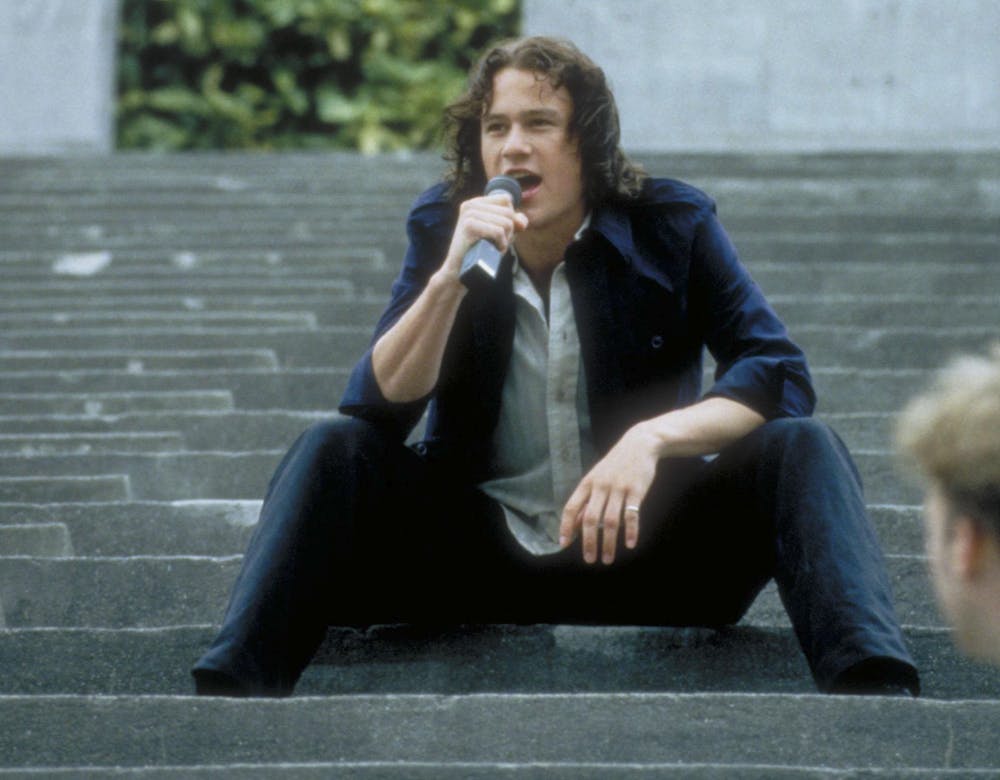Theatergoers listened when Blake Lively told fans to “Grab your friends, wear your florals, and head out to see it" as she promoted her newest film, “It Ends With Us.” Excited at the prospect of turning their brains off and watching a predictable, yet comforting movie, audiences were surprised to say the very least.
Merriam Webster defines a romantic comedy as “a light, comic movie or other work whose plot focuses on the development of a romantic relationship.” By that standard, “It Ends With Us,” a story that features heavy themes of domestic violence, does not fit.
Stamping any film with the rom-com label is a bold claim to make. The most iconic rom-coms are the ones that can be constantly on repeat on cable, eliciting a rewatch every time. The films are heartwarming, yet humorous, and are always met with a happy ending. The marketing for the “It Ends With Us” film was lighthearted, while the story is about Lily Bloom, a woman trapped in an abusive marriage. The underplaying of these triggering topics shows why we need to separate rom-coms from romantic dramas.
The film “Anyone But You,” starring Glen Powell and Sydney Sweeney, generated $170 million globally. Another rom-com, “The Idea of You,” was a streaming success with over 50 million views worldwide. Released earlier this year, “Lisa Frankenstein” has already cemented itself into cult status, mastering the ‘80s horror rom-com. These successes hint to studios that audiences are wanting more.
I watched Frank Capra’s 1934 “It Happened One Night,” often considered the first true romantic comedy, on Tubi last week to get a feel for the genre. I am a classic aficionado, but recently have found myself completely unable to focus. Short-form content has most definitely been ruling my life. Despite that recent inattentiveness, I found myself sucked into the pre-code era film. A familiar road-trip rom-com, filled with tropes that feel almost modern. The classic tells the story of Ellie, a wealthy socialite who has run away from her father who opposes her recent elopement. She then meets Peter, a rough reporter who agrees to help her reunite with her husband in exchange for her story. It is enemies to lovers in the truest sense. They fight all the way from Florida to New York City and of course, fall in love on the way there – a classic romantic comedy trope that has remained true ever since.
But the genre has transformed significantly since then. The golden age of Hollywood brought us formulaic tales, often featuring a musical underscore as seen in 1952’s “Singin’ in the Rain” and 1959’s “Some Like it Hot.” During the 1980s and 1990s, we saw a rise in the wittier romantic comedy, emphasizing chemistry. My all-time favorite film, the 1989 film “When Harry Met Sally,” brought the world the iconic duo of Meg Ryan (a rom-com icon) and Billy Crystal, who, when I saw him in the Broadway production of “Mr. Saturday Night,” truly left me starstruck.
As the years pass, the world continues to shift.
In recent years, many actors have begun to almost beg to star in a romantic comedy. Daniel Radcliffe revealed that his dream project is a rom-com with Abbott Elementary creator and star actress Quinta Brunson, a pairing that would make my entire world. In 2023, Dave Bautista commented that he’d love to be in a rom-com but was never given the opportunity. Just this week, Bautista revealed that he immediately began getting calls after his statement. Even Meg Ryan has returned to the genre with her latest film “What Happens Later.” It is a genre with continuous appeal. The interest is apparent and reflects a trend in the industry.
But what does the modern romantic comedy look like? It is far more than just a chick flick. Today’s rom-coms feature increased inclusivity, showing audiences that love is for everyone. One of my personal favorites, 2018’s “Crazy Rich Asians,” not only centers on romantic relationships but on the complexities of cultural expectations and family. The modern rom-com shows the broad range of experiences that humans have, allowing for everyone to feel seen in the genre.
Yes, love is more than just grand gestures, although Heath Ledger’s “Can’t Take My Eyes Off Of You” scene from the 1999 film “10 Things I Hate About You” is my ultimate dream. Today’s rom-coms celebrate both the joy of love and the challenges that come with it.






